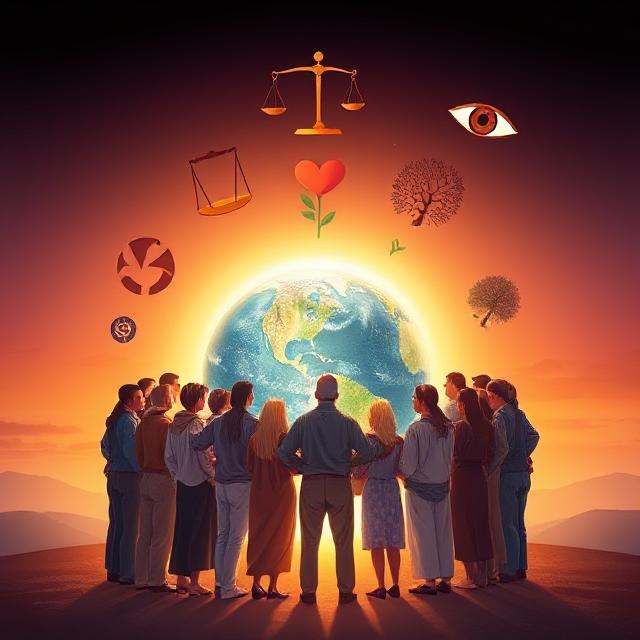
Table of Contents
Are There Universal Human Values?
Are there universal human values, or is morality shaped entirely by culture? This timeless question cuts to the core of ethics, anthropology, and global dialogue. While some argue that values like justice, compassion, and honesty are innate to humanity, others point out the vast moral diversity across cultures as evidence against universality. This article examines the arguments for and against universal human values and explores whether moral common ground can exist in a world of profound cultural difference.
I. Defining Human Values
Human values are principles or standards that guide behavior, help distinguish right from wrong, and structure social life. These can include honesty, loyalty, fairness, freedom, respect, and compassion. While such values are widely admired, their interpretation and application vary drastically from one culture to another.
The question, then, isn’t merely whether people value similar things, but whether there are core values that all humans recognize, regardless of time, place, or belief system.
II. Arguments for Universal Human Values
A. Shared Evolutionary Psychology
Proponents of universality often point to evolutionary roots. Humans evolved in social groups, and cooperation was vital for survival. Evolutionary psychologists argue that moral sentiments like fairness, empathy, and reciprocity developed to support group cohesion.
For example, experiments show that infants as young as six months prefer helpful behavior over harmful behavior. This suggests that some moral instincts may be hardwired into the human brain.
B. Philosophical Universalism
Philosophers such as Immanuel Kant and John Rawls believed in universal principles of morality based on reason. Kant argued that moral laws must apply to all rational beings, regardless of context. His famous “categorical imperative” implies a form of moral universality: treat others as ends in themselves, never merely as means.
Rawls’ theory of justice assumes that fairness and equality are values that any rational person would choose behind a veil of ignorance about their position in society.
C. The Universal Declaration of Human Rights
In 1948, the United Nations adopted the Universal Declaration of Human Rights (UDHR), asserting that all human beings are entitled to basic rights and freedoms. The UDHR reflects values like dignity, liberty, and equality as universally valid.
Though drafted primarily by Western thinkers, it was influenced by diverse traditions, including Confucian, Islamic, and African humanist perspectives. Its global acceptance lends weight to the idea that certain values transcend culture.
III. Arguments Against Universality
A. Cultural Relativism
Cultural relativists argue that morality is socially constructed and context-dependent. What is considered virtuous in one society may be taboo in another. For instance, individual freedom is prized in Western democracies but subordinated to harmony and duty in many East Asian cultures.
Franz Boas and other anthropologists emphasized that no culture’s morality is inherently superior to another’s. Each moral code is a product of historical, ecological, and social forces unique to that culture.
B. Historical and Contemporary Examples
Practices like polygamy, arranged marriage, dietary restrictions, and gender roles differ significantly across societies. Even concepts like justice and fairness are interpreted through culturally specific lenses.
For example, Western legal systems focus on punishment and rights, while many Indigenous traditions emphasize reconciliation and communal responsibility.
C. Critiques of Western Bias
Some critics argue that claims of universality often mask Western ethnocentrism, imposing Western ideals under the guise of moral objectivity. Concepts like individualism, secularism, and gender equality, while noble, may not hold the same priority in other worldviews.
IV. Seeking Common Ground
A. Moral Convergence Theory
Some scholars propose moral convergence rather than strict universality. This theory suggests that societies independently arrive at similar moral conclusions due to shared human needs and problems, even if they express those morals differently.
For instance, every society has taboos against unjustified killing and norms around family structures. The details differ, but the underlying value—protecting life and kin—remains recognizable.
B. Cross-Cultural Dialogues
Globalization, migration, and international law necessitate moral dialogue across cultures. Philosophers like Martha Nussbaum argue for a “capabilities approach”: emphasizing what all humans need to live a full life, such as health, education, and freedom from violence.
This framework allows for cultural variation while still asserting a core set of moral priorities rooted in human dignity.
C. Shared Human Experiences
Despite our differences, all humans experience birth, death, joy, suffering, hope, and fear. These universal experiences can be the foundation for empathy and shared moral understanding.
Literature, art, and religion often express this universality. From the Bhagavad Gita to Shakespeare to African proverbs, humanity’s core themes repeat across cultural lines.
V. Conclusion: Are There Universal Human Values?
Are there universal human values? The answer may not lie in absolute uniformity but in recurring moral patterns across diverse societies. While cultural relativism rightly cautions against ethnocentric moralizing, evidence from psychology, philosophy, and cross-cultural practice suggests that some moral instincts—like empathy, fairness, and a desire for dignity—may be intrinsic to human beings.
Instead of demanding identical moral codes, a wiser approach may be to seek intercultural consensus grounded in shared human needs and aspirations. Moral pluralism need not exclude moral commonality.
In a world of difference, the search for universal human values remains both a philosophical challenge and a moral imperative.
